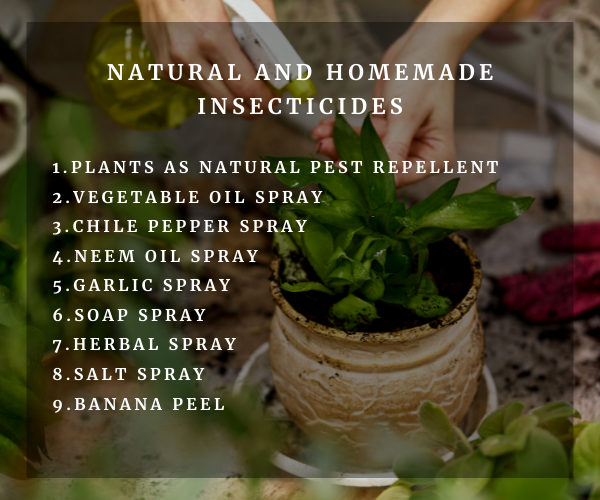
These natural and homemade insecticides are efficient at ridding your crops of dangerous pests while remaining safe for you and your family.
1. Plants As Natural Repellent
Certain plants, such as marigold, onion, garlic, and chives, have a strong odor that repels aphids. As a result, you may grow them near your Tulsi to avoid using pesticides on it.
2. Vegetable Oil Spray
A DIY pesticide prepared from vegetable oil combined with a mild soap can be quite effective against aphids, mites, thrips, and other pests.
To make a basic oil spray insecticide, combine one cup of vegetable oil with one tablespoon of soap, cover, and shake thoroughly. When ready to use, combine two teaspoons of the oil spray mix with one quart of water, shake thoroughly, and spray directly on the surfaces of the plants that are infested.
The oil coats the insects’ body, it effectively suffocates them by blocking the pores through which they breathe.
3. Chili Pepper Spray
Chile pepper spray is an effective natural insect repellent that can be manufactured at home and used on a range of pests. Fresh spicy peppers or chile pepper powder can be used to make chile spray.
Mix one tablespoon of pepper powder with one quart of water and a few drops of mild liquid detergent to produce a basic chile spray. On the leaves of afflicted plants, this combination can be applied at maximum power. Blend or puree one-half cup of fresh chile peppers with one cup of water to produce chile spray, then add one quart of water and bring to a boil. Allow it cool before straining off the chile material, adding a few drops of liquid soap and spraying as desired.
4. Neem Oil Spray
The oil derived from the seeds of the neem tree is a potent natural pesticide that may interrupt the life cycle of insects at all stages of development, including adult, larvae, and eggs, making it a valuable resource for organic gardeners.
Follow the directions on the package to use neem oil as an insecticide, or start with a simple combination of two teaspoons neem oil and one teaspoon mild liquid detergent mixed well with one quart of water and sprayed on the afflicted plant leaves. Neem oil can also be used to prevent pest infestations by treating the leaves of pest-prone plants before they get affected.
5. Garlic Spray
Garlic spray’s strong odor is helpful in keeping bugs and pests at bay. Take two garlic bulbs. Remove the outer layer and combine it with 2 cups of water in the grinder. Keep this solution in the refrigerator overnight. After that, strain the mixture. Combine 1 teaspoon of mild soap and 1 liter of water in a mixing bowl. Fill a spray bottle halfway with this solution and spray it on the affected areas.
6. Soap Spray
The simplest treatment for plants pest is a homemade soap spray. Simply combine 4-5 teaspoons of non-detergent or dish soap with 7-8 cups of plain water in a washing machine. Fill a spray container halfway with the solution once it has been well mixed. Early in the morning, spray it on the diseased areas or the leaves.
7. Herbal Spray
Essential oils like eucalyptus, thyme, basil, rosemary, and mint are also effective at repelling insects. You may buy it at a shop and dilute it with water before using it. Alternatively, soak the crushed leaves in water overnight. Then, in the morning, strain it to use as a natural pesticide spray.
8. Salt Spray
Salt not only repels insects and pests, but it also improves the soil’s nutrition absorption capacity. Simply combine 1 liter of water with 1 spoonful of salt. Apply this solution to the plant’s base and diseased areas.
9. Banana Peel
A banana peel is one of the easiest methods to keep pests at bay. Simply grab some banana peel and thoroughly cover the plant’s base. It will not only keep aphids away, but it will also enhance the condition of the soil by adding important minerals like potassium and phosphorus.
To keep plants safe from pest infestations, proper maintenance is the first line of defense. Water and fertilize the plant regularly. Also, never keep the soil wet; always allow excess water to drain from the container.

Great post! I enjoyed reading it and learned a lot. Your writing style is engaging and easy to follow, and the information you provided was very helpful. Thank you for sharing your knowledge and expertise on this topic. Keep up the good work.